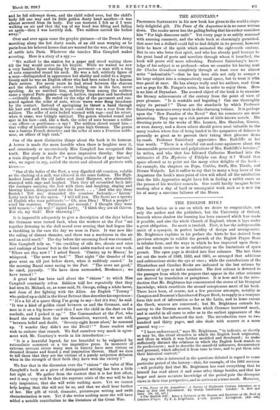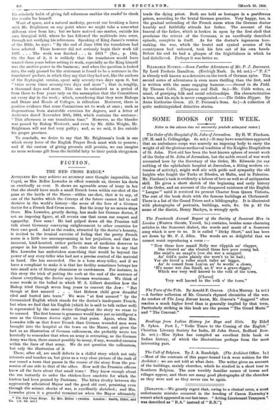THE ENGLISH ItrfE.t THE book before us is one on
which we desire to congratulate, not only the author and the publishers, but the University of Oxford, beneath whose shadow the learning has been amassed which has made it possible, and also the whole Church of England, whom it lays under a great obligation. Its merit is twofold. First, it has the indispensable merit of a synopsis, in perfect lucidity of design and arrangement. Mr. Brightman explains in his preface the hints he has derived from previous attempts to exhibit the growth of the English Prayer Book in tabular form, and the ways in which he has improved upon them : and the result seems to us as satisfactory as the limitations of space permit. The open page is divided into four columns. The last three set out the texts of 1549, 1552, and 1661, so arranged that additions and subtractions strike. the eye at once ; while the contributions of the Elizabethan and Caroline Books- are indicated in the last column by differences of type or index numbers. The first column is devoted to the passages from which the prayers that appear in the other columns are derived by translation or paraphrase. It is here and in the intro- - duction that Mr. Brightman has concentrated the stores of his litargioat knowledge, which constitute the second- conspicuous merit of his book. There have been, of course, not a few previous attempts, notably Campion and Beamont's Interleaved Prayer Book, to supply in a compact form this sort of information so far as the Latin, and to -some extent the Greek, sources are concerned ; but Mr. Brightman extends his survey to the German sources, from which Cranmer borrowed much, and is careful in all cases to refer us to the earliest appearance of the • pomace which has influenced the text. The introduction runs to two hundred and thirty pages, and also deals with sources in a more
general way :— " I have endeavoured," says Mr. Brightman, " to indicate, as shortly as may be, the ritual situation in which the English book originated,
and those in which it was further modified and develo ; to matte , sufficiently distinct the relations in which the English stands ,to its predecessors ; and to describe the manifold influences, documentary and personal, which affected it from time to time, and to put them into their historical context."
Any One who is interested in the questions debated in regard to sonic particular period of the history—that, for example, of the 1661 revision —will probably find that Mr. Brightman has read everything that lie himself has read about it and some other things besides, and that his larger and more accurate knowledge of the period puts the divergent views in their true perspective, and so arrives at a truer result. Moreover,
• The Peace of the Augustan: a Survey of Eighteenth Century Literature as a Place of Rest and Refreshment. By George BaIntabnry. London : G. Bell and Sons. 188. ed, net.) t The PAglieh Bird : being a Synopsis of the Sources and Revisions of the Book q Common Praycr. By F. E. Brightman. 2 Iola. London: itiviegtons. rsit4
his scholarly habit of giving full references enables the madei to check the results for himself.
Want of space, and a natural modesty, prevent our breaking a lance with Mr. Brightman on any point whore we might take a somewhat different view from his ; but we have noticed one matter, outside his own liturgical field, where ho has followed the multitude into error, through not verifying his references. Speaking of King James's version of the Bible, he says : " By the end of June 1604 the translators had been selected. These however did not seriously begin their work till 1607. . . . The work was finished . . . in 1611 " (Int., p. 184). On the face of it, it is unlikely that the translators would have wasted three years before setting to work, especially as the King himself was the motive-power in the business ; and when the question is looked into, the only ground for the statement is found to be a sentence in the translators' preface, in which they say that they had not, like the authors of the Septuagint version, spent only seventy-two days upon it, but " twice seven times seventy-two days and more " ; that is, roughly, a thousand days and more. This can be estimated as a period of from three to four years only on the assumption that the Committees sat every day in the week ; which, considering that they were Bishops and Deans and Heads of Colleges, is ridiculous. Moreover, there is positive evidence that some Committees set to work at once ; such as dispensations from statutable exercises for degrees, and a. letter of Andrewes dated November 30th, 1604, which contains the sentence : " This afternoon is our translation time." However, as the blunder was passed by Bishop Westcott, and even by Mr. Aldis Wright, Mr. Brightman will not feel very guilty ; and, as we said, it lies outside his proper province.
To conclude, we desire to say that Mr. Brightman's book is one which every lover of the English Prayer Book must wish to possess ; and if the custom of giving presents still persists, we can imagine no more welcome gift from the faithful laity to their parish clergyman.



























 Previous page
Previous page